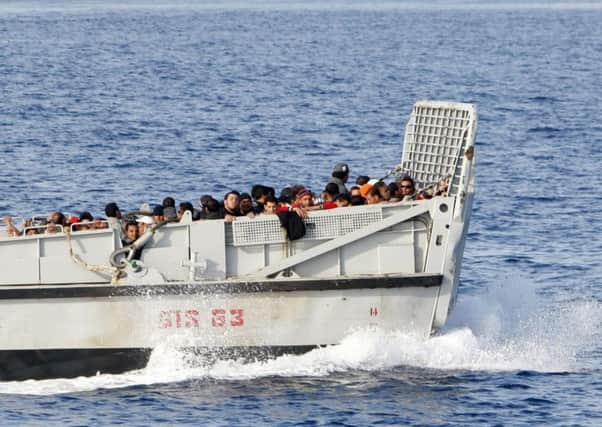Global refugee total worst since WWII, says UN


Half are children, many of them caught up in conflicts or persecution that world powers have been unable to prevent or end, the United Nations High Commission for Refugees said in its annual global trends report.
“We are really facing a quantum leap, an enormous increase of forced displacement in our world,” UN High Commissioner for Refugees Antonio Guterres told a news briefing in Geneva.
Advertisement
Hide AdAdvertisement
Hide AdThe overall figure of 51.2 million included 16.7 million refugees, 33.3 million displaced within their homelands, and 1.2 million asylum-seekers whose applications were pending.
Syrians fleeing the escalating conflict accounted for most of the world’s 2.5 million new refugees last year, the report said.
In all, nearly three million Syrians have crossed into neighbouring Lebanon, Turkey, Iraq and Jordan, while another 6.5 million remain displaced within Syria’s borders.
The conflict has uprooted many families not once but several times. Their access to food, water, shelter and medical care is often extremely limited, and because they remain inside a conflict zone, it is hard for aid agencies to reach them.
Worldwide, the UN estimates there are now 33.3 million internally displaced people.
“We are seeing here the immense costs of not ending war, of failing to resolve or prevent conflict,” Mr Guterres said. “We see the security council paralysed in many crucial crises around the world.”
Conflicts that erupted this year in the Central African Republic, Ukraine and Iraq are driving more families from their homes, he said, raising fears of a mass exodus of Iraqi refugees.
There had been “a multiplication of new crises, and at the same time old crises that seem never to die,” he added.
Advertisement
Hide AdAdvertisement
Hide AdAfghan, Syrian and Somali nationals accounted for 53 per cent of the 11.7 million refugees under the UN’s responsibility. Five million Palestinians are looked after by a sister agency.
Most refugees have found shelter in developing countries, contrary to the myth fuelled by some populist politicians in the West that their states were being flooded, Mr Guterres said.
Many desperate refugees and migrants from the Middle East and Africa have drowned after boarding rickety boats in North Africa to cross the Mediterranean to reach Europe, mainly via Italy.
Italy has a mission, known as Mare Nostrum or “Our Sea”, which has rescued about 50,000 migrants already this year. Italy will ask the European Union next week to take over responsibility for rescuing migrants, a task that is costing its navy millions of pounds a month.
“It is important to have a European commitment there and to make sure that such an operation can be sustainable,” said Mr Guterres, a former prime minister of Portugal.
The EU bloc has harmonised its asylum system, but the 27 member states still differ in how they process refugees and in their approval rates for asylum applications, he said.
A record 25,300 unaccompanied children lodged asylum applications in 77 countries last year, according to the agency.